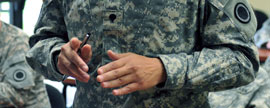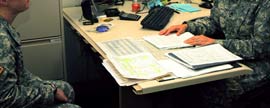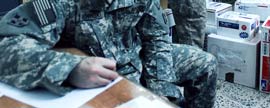Short answer: Most likely / bordering on definitely.
During the current downsizing of the Army, every misconduct is being scrutinized. A positive UA is a definite detractor from your career. IAW AR 635-200 and AR 680-35 (ASAP) separation proceeding must be initiated for drug use. If you are a first term Soldier I would say there is a 99.9% chance you will be separated. However, the final determination is up to the Separation Authority, normally the first Colonel in your chain of command.
The only way I could see a Soldier even being considered for retention by the separation authority is if the following were true:
- The Soldier had no other misconduct, ever, and the positive UA was for THC (marijuana) and not a drug such as cocaine or heroin.
- The Soldier has an over abundance of exceptional service which would outweigh the one drug use. Multiple deployments, purple heart, etc.
- Your entire chain of command up to and including your Battalion CSM and CDR recommend retention to the separation authority.
Even having said that, retention is usually not an option for NCOs. It would be near impossible to lead Soldiers, especially if you were to stay in the same unit, after having an article 15 for drug use. Not to mention the negative effect it would have on the morale, good order, and discipline of the unit. NCOs are held (and rightly so) to a higher standard than junior enlisted Soldiers.
Disclaimer: I am not an attorney and any views presented are my own and are not to be
interpreted as legal advice. Furthermore, my views do not necessarily
represent the views of DoD or its Components.















Comments
jeremy
Hello. I have a similar situation where I had a positive UA and then was told by jag that I would ETS before my battalion even got close to getting to the seperation. I tool the jag soldiers advice and was given honorable with RE code 1. How do you think this might effect my getting back into the Army or background checks for federal civilian work. I will add that I received an article 15 and was dropped in rank from e4 to e1 and when I was etsing they almost gave be a dd214 with CPL rank on it and noticed it was wrong at the last minute! So now everyone who sees my dd214 can seee everything is good but rank after 4 years is E1 :-/
Mark Gerecht
Jeremy,
Since you ETS’d as an E-1 odds are the you would not be able to reenlist. The Army database will contain this information. A recruiter would immediately see there was an issue and begin digging into the database. Also we are in the midst of a major draw down so the odds of taking prior service at this time is slim. Now that could change in the future and if they need folks bad enough they may consider taking you back in. With regard to civilian employment in the federal government odd are your unit submitted a derogatory information report to your S-2 as such the information should be entered into your file. If you have to undergo a back ground check then the best course of action is to tell the truth. Usually this works in your favor, but if you choose to hide it and they find out you will not receive a clearance as they see lying as a severe violation of character.
Hope this helps!
Did you find this information useful? We would appreciate your feedback!
TOP
Bex
My boyfriend tested positive in the drug test. He is in the navy. he just found out yesterday. He was on leave last month and did a really dumb thing while on vacation. If he tests again, he will pass for sure since he’s not really a habitual user of marijuana. What are the chances he can stay in the navy? Please help. Thank you.
Mark Gerecht
Bex,
Not real familiar with the Naval aspect drug policy but it should work the same way. Basically now is not the time to get in trouble. All the services are drawing down due to budget cuts. In the Army a Soldier is typically separated for one violation. There is an exception that allows for the Soldier to stay in but those exceptions are rare. I would encourage you to either read the Naval policy on Substance Abuse or feel free to call the Naval IG and simply make an anonymous inquiry. No name, no phone number, no email, etc. Simply ask for the regulations that explain what happens if a Sailor comes up positive on a UA. And then ask them if they could walk you through the process and what the likelihood is that a Sailor would be retained for substance abuse in today’s navy.
I found the following information that may be of assistance to you:
5350.4D
Navy IG offices
Hope this helps a little.
Did you find this information useful? We appreciate your feedback!
TOP
Sarah
I was wondering what happened with your situation cuz I have a friend in the same one was he processed out ?
Eck
Eddie,
If your ETS date has passed, then you should have separation orders and have out processed your duty stationed and received your DD-214 – Certificate of Release or Discharge from Active Duty. In block 24 of your DD-214 it will show your discharge characterization. Your separation orders will indicate if you are being separated due to ETS or by administrative separation. I am assuming, since you indicated you elected an administrative separation board and one did not occur, that you have ETS’d. Any separation action has to be finalized BEFORE a Soldier’s ETS date. A Soldier can not be involuntarily extended past their ETS date so a unit can finish an administrative separation. The only way a Soldier can be involuntarily extended past their ETS date is if they are pending court-martial charges and charges have already been preferred prior to their ETS date. This does not appear to be your case.
If you are still with your unit and your ETS date has passed, go see your attorney. He/she will help you rectify this situation. If you have already ETS’d, then you will receive an honorable discharge with all the benefits that come with it.
I hope you found this useful.
Eck
“I am not an attorney and any views presented are my own and are not to be interpreted as legal advice. Furthermore, my views do not necessarily represent the views of DoD or its Components.”
Eddie
I had a failed UA my rank was E5 in the Army. My unit started the separation process and I got an attorney. Me and my attorney requested the administration board and submitted paperwork to unit. My Co commander stated to me his recommendation to higher would be for no administration action. That was the last time I spoke with my command on the incident and my ets date has already come and pass. I also have taken in and turned in all gear to supply. My question is can they give me and General Discharge under Honorable Conditions for my discharge. Or would I get an honorable discharge. The only thing that was done was I was flagged and I don’t believe the flag was eve lifted prior to ets.
Pothead
I’m kinda in the same boat as Eddie here. E5 AD 8 yrs in 2 DEP 2 iraq an recipient of Purple Heart. Have no prior negative actions. I have under a year till ETS an was just recommended for MEB. I have not failed my UA but there is a chance I might, for use of Marijuana. I know if I pop hot CO CMD starts separation. I curious by his attorney recommending administrative board what could that lead to. If higher shoots down no administrative action recommendation?
If I was to fail UA what would my options be?
Eck
If you do pop hot on a UA the command is required to initiate separation actions against you IAW AR 635-200 and AR 600-85. Since you have over six years of service you are entitled to have your separation decided by an Administrative Separations Board (ASB). You are also entitled to waive this board if you so choose. This would be a decision to make with your Trial Defense Services (TDS) attorney. (If separation action is initiated, it is mandatory for you to speak with a TDS attorney.) An ASB just means that a board (similar to a promotion board) will hear your case and make a recommendation to the separation authority if you should be retained or discharged and what type of discharge characterization you should receive. Then the separation authority can approve the boards recommendations or he/she can change them. However, the change can only be to the benefit of the Soldier, not worse. For example, if a board recommends the Soldier be retained, the separation authority cannot order separation. Also, if the board recommends separation but with an honorable discharge, the separation authority cannot discharge you with anything less than an honorable discharge certificate.
Now, if you are in the MEB process, then the separation action goes on as normal up to the point of final disposition. The separation authority has to wait until the MEB portion of the process is complete. Then, the MEB packet and the separation action will go before the separation authority at the same time. The separation authority will then decide whether you should be allowed to continue with the MEB/PEB process for medical separation or whether you should be separated under the administrative separation action for misconduct.
Each case is different. Consult with your TDS attorney if you are processed for administrative separation due to a positive UA. In the mean time, I strongly suggest you refrain from any future misconduct and make a smooth transition from the service to civilian life, whether that be through the MEB process or via ETS.
I hope you found this use full.
Eck
“I am not an attorney and any views presented are my own and are not to be interpreted as legal advice. Furthermore, my views do not necessarily represent the views of DoD or its Components.”
Cheri
Hoping someone can give us some hope. My son joined the National Guard when he was 17 yrs old and a junior in High School. He is now 21 and for the first time tested tested positive for thc on a drug test. He has not been told anything at this point. He is willing to take a cut in pay, a cut in rank and pay for any counseling that the NG would deem necessary for the chance to prove that he can be a good soldier. This has truly made him realize how important the NG is to him and also how important it is to his future. Is there any chance of him being able to stay in? By the way, he has a new Commander that he met the day he tested positive-not good.
Mark Gerecht
Cheri,
This is not a good time to be in trouble in today’s military. In the past first time offenders in the grade of E-4 and below typically received another chance based upon other aspects of their performance and potential. In today’s military the Active Army, Army National Guard, and Army Reserves are looking to downsize the force as quick as possible. To do this they are looking for Soldiers that do not meet the standard. These typically include: Individuals that abuse drugs/alcohol, fail the Army Physical Fitness Test, and/or are Overweight. Now there is an exception that allows commanders to provide 1st time offenders the ability to be retained. The decision typically rests with the Battalion Commander as the decision authority. Your son will need every member of his chain of command (Squad Leader, Platoon Sergeant, Platoon Leader, 1SG, and Company Commander) to stand up for him if he stands a chance of the Battalion Commander making a decision to retain him in the service. It is unlikely he will be retained but if he can build a strong enough case and has the support from his chain of command there is a possibility he can overcome this.
AR 27-10 (Legal Manual) and AR 600-85 (Army Substance Abuse Program) provide some useful information for your son to review and put his case together. The Battalion Commander could also choose a seldom used action in which your son is separated from serviced and then that action is placed in suspension for up to 1 year. This is basically probation. If he conducts himself as a professional Soldier and successfully completes the probation he is allowed to remain in service. If he fails to maintain the standard during the probation period he is immediately separated from service. There are several other possibilities available to the commander. I am available to speak with you offline concerning the specifics of the case and options that maybe available to you. I will send you an email with my contact information. Keep in mind the Army National Guard tends to have its own procedures for handling these issues and they may differ from Army policy and procedure as the Guard is responsible to the Governor of the State.
Did you find this information useful? We appreciate your feedback!
TOP
Jessica
Cheri,
I’m the Substance Abuse Coordinator for the WA ARNG. Every state for the ARNG has a different policy, unlike Active Duty. What state is your son in? We went to a zero tolerance in Jan 2011. Most states for the ARNG are not, but everyone is still processed for separation per the AR 600-85. The Commander makes his/her recommedation, but ultimately it’s up to The Adjutant General and then of course whatever the policy is for each state. Before we had a zero tolerance, if a Soldier was going to be retained, he had to get a drug assessment, take an 8 hour drug/alcohol class, and rehab if needed. Then they are drug tested every month during drill weekend for one year. Ultimately, it is the Commanders discsretion. I’ve seen many young Soldiers get kicked out in their first 2 years of service all for some weed….our Soldier’s are separated in 3-5 months, so we have implemented a very quick process which is also lowering our positive rate. I wish your son the best.
Preston
Wow. Thanks for the informed perspective, Jessica. Good information there.
Eck
Hi Laura,
I cannot address specifics on your husbands case, but I can provide some basic information that applies to all cases similar to your husbands.
If your husband has a valid prescription for the drugs he tested positive on, then he should be fine. However, there is no legitimate medical use for heroin that I am aware of. It is up to the unit on how fast they act on a positive UA. Action can range from, but not limited to, an Article 15 to separation for misconduct, or a combination of punitive and administrative actions.
One thing that jumps out at me is that you mention that your husband tested positive in the ASAP program. He either self referred or he has a prior drug/alcohol issue that got him command referred to the ASAP program. A pattern of misconduct will not help your husband’s position.
However, the positive UA during the ASAP program may fall under limited use rules. This is something for your husband to discuss with his attorney.
If your husband hits six years of service, to include any reserve and delayed entry time, before the unit initiates separation action, then your husband will be entitled to a separation board. His attorney will advise him accordingly on this also.
If your husband is placed in the MEB process, then he cannot be separated prior to the MEB process being complete. The separation action can be processed up to the point it goes to the separation authority for final decision. Once the MEB process is complete, and assuming the MEB indicates your husband is no longer medically qualified for continued service, the MEB packet and the separation packet will go before your husbands Commanding General (CG) at the same time. The CG will decide whether your husband is separated for misconduct or will be allowed to finish the MEB process and separate under the medical program.
I hope you found this information useful.
Eck
“The views presented by the author are his own and do not necessarily represent the views of DoD or its Components.”
Disclaimer: I am not an attorney and any views presented are my own and are not to be interpreted as legal advice. Furthermore, my views do not necessarily represent the views of DoD or its Components.
laura
My husband recently failed a U.A in the asap program, he is coming up on his 6 yrs (less than two months away) He has not yet been read his article 15, or even told what was happening to him as of right now. He passed many u.a’s before this, and just the day before he was told about his bad u.a he was told by his P.A that he was being recommended to the med board for his back, he has serious back issues now due to being a paratrooper and his p.a simply told him, its not getting any better. But, now that he has pissed hot for morphine & heroin (has a narco prescription, the morphine is correct and just with his pills, but the heroin is really a shock, he swears he hasn’t ever touched the stuff) he called the attorney on base, this guy told him to keep his mouth shut. To get the attorney on the case, being he is so close to 6 yrs and 1 day if he can’t fight it and stay in, he can at least prolong the separation and make it to his 6yr mark to get his benefits and an honorable discharge ..does any of this sound right? Its been two days now, he’s already turning in his equipment, and taking blood tests ..ect..yet hasn’t been told anything. I’m confused and scared as to whats going to happen..as this does not only affect him, but our family obviously. any advice would be greatly appreciated.
Preston
I’m not a chemist, but I believe that heroin is metabolized by the body into morphine. It seems likely to me that a generic opiate test may pop positive for both/either. Meaning, it may not distinguish between the two. I’ll leave the other parts of your question to the experts.
PV2 Smith
HI I AM AN ACTIVE DUTY SOLDIER WHO CAME UP HOT ON A UA. I SELF REFFERED MYSELF TO ASAP WAY BEFOR MY NEGATIVE RESULTING TEST. IS THERE ANY REGULATION THAT PROTECTS A SOLDIER IN MY POSITION BECAUSE MY UNIT HAS INITIATED SEPERATION.
Mark Gerecht
AR 600-85 contains a limited use policy that allows Soldier protection under certain conditions if they self refer. I would encourage you to read AR 600-85 and make an appt with JAG to see if your situation qualifies.
Did you find this information useful? We appreciate your feedback!
TOP
ECK
During your separation proceedings you are afforded the opportunity to speak with an attorney at the Trial Defense Service (TDS) office. DO NOT waive this right and ensure you speak to an attorney who will advise you on your case. Each case is different.
There are some situations when limited use evidence can be used for a separation. Make sure you speak to an defense attorney.
Disclaimer: I am not an attorney and any views presented are my own and are not to be interpreted as legal advice. Furthermore, my views do not necessarily represent the views of DoD or its Components.
PV2 Smith
thank you I found this information very valuable
Jessica
If you self refer, you are still processed for separation. It’s Commander’s discretion if he/she wants to retain you. However, you are protected under the limited use policy since you self referred, so if you are separated, you will be separated with an Honorable.
Eck
Jessica, just because a Soldier self referred to ASAP, does not give the Soldier continued protections under “limited use” guidelines.
Limited use always applies when the drug test is given solely as part of treatment at the ASAP program (AR 600-85, para 10-12a(7)).
However, if after self enrolling, a Soldier tests positive in a random urinalysis at the unit, that test result is not protected under “limited use” guidelines. See para 10-12a(6), AR 600-85,
“Drug or alcohol test results, if the Soldier voluntarily submits to a DOD or Army rehabilitation program before the Soldier has received an order to submit for a lawful drug or alcohol test. Voluntary submission includes Soldiers communicating to a member of their chain of command that they desire to be entered into a rehabilitation program.
This limited use protection will not apply to test results, which indicate alcohol or other drug abuse occurring after the voluntary submission to the rehabilitation program. Examples: The unit commander has ordered a urinalysis on Monday for all members of the unit (an inspection under MRE 313). Before receiving an order (or having knowledge of a pending test) to appear for the urinalysis, a Soldier approaches the platoon sergeant, admits having used illegal
drugs over the weekend, and indicates a desire to receive help. Later that day, the Soldier is ordered to and provides a specimen for the urinalysis, which results in a positive report for cocaine use. Those results are protected by the limited use policy unless there is some evidence that demonstrates the use reflected by the test occurred after the admission was made to the platoon sergeant. Later that week, the commander orders another unit inspection for the following
Monday. The inspection is conducted properly under MRE 313, and the Soldier once again has a positive result for cocaine. These test results, as interpreted by an Army Forensic Toxicology Drug Testing Laboratory (FTDTL) expert, indicate the Soldier had used cocaine after admitting use to the platoon sergeant. This test result is not protected by the Limited Use Policy.”
The limited use policy is intended to be a one time assist for a Soldier to get help. It does not protect the Soldier from subsequent unit testing. Subsequent positive tests can result in the Soldier being separated with a less than Honorable characterization of service.
Eck
“I am not an attorney and any views presented are my own and are not to be interpreted as legal advice. Furthermore, my views do not necessarily represent the views of DoD or its Components.”
Mark Gerecht
Eck and Jessica,
Greatly appreciate the interaction and sharing of information. Whenever this type of exchange occurs on the site I usually learn something. This case is no exception. Sometimes you even make an old guy go look up the regulation. I really appreciate the two of you sharing information.
Our goal at ASKTOP.net is to provide the individual with the regulatory guidance, share related experiences, and then perhaps provide some feedback or information for the individual to consider as they work their way through a given situation.
Thanks Again
TOP